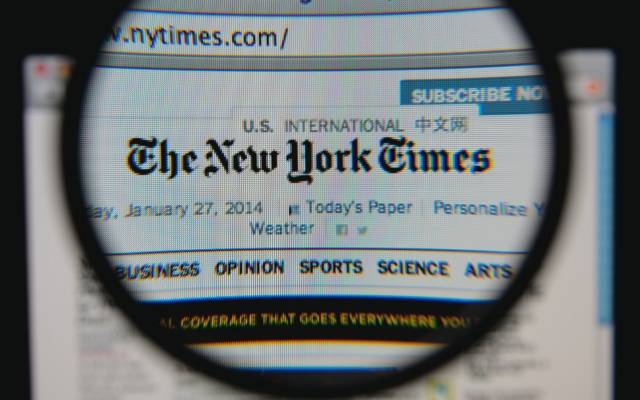A New York Times editor admitted that the publication has an Israel-bias, but defended it. A media watchdog said it is the most criticized section because it is the topic the newspaper “skews most dramatically and consistently.”
The prominent New York Times newspaper has been roundly and repeatedly criticized for its anti-Israel bias, and now even one of its editors admits – it’s a real bias.
Andrew Rosenthal, the editor of the NYT opinion pages, gave an interview last week and reflected on the impact, range and challenges the widely-read section faces.
He conceded that “writing about the Israeli-Palestinian conflict is extremely difficult. The only guarantee when we write about that conflict is that everyone will be mad.”
Asked about what the most common complaint is about the paper’s opinion coverage, Rosenthal answered, not surprisingly, that the most common complaint is “that we’re anti-Israel.”
However, he defended the paper’s anti-Israel stance, saying “I don’t accept the idea that criticizing Israeli policy is the same as being anti-Israel. We have been big supporters of Israel’s right to exist and of the need for the US to support this right, with force when necessary. This doesn’t mean that we agree with [Israeli Prime Minister] Benjamin Netanyahu all the time or that we support all of Israel’s policies.”
Rosenthal’s Claim ‘Withers’ Under Examination
A media watchdog, which has been studying the Times for years, rejected Rosenthal’s claim.
Gilead Ini, a senior research analyst for the Committee for Accuracy in Middle East reporting (CAMERA), told The Algemeiner on Tuesday that Rosenthal’s assertion “withers with an examination of the actual content of the paper.”
“On multiple occasions, Rosenthal published op-eds calling for an end to Israel,” Ini said. “If he wants to make the case that the opinion pages aren’t anti-Israel, let him point out any op-eds he published calling for an end to Pakistan or Ireland. He won’t be able to, because they don’t exist.”
The Israeli-Palestinian conflict is the most criticized aspect of the Times’ coverage, said Ini, because it is the topic the newspaper “skews most dramatically and consistently.” He noted that “if anything, the opinion pages, which Andrew Rosenthal predictably defends, are worse” than the publication’s news section when it comes to biased coverage of Israel.
Ini said a recent Times article questioning the existence of the two Jewish Temples on the Temple Mount was “absolutely skewered by experts and ultimately walked back.”
He also slammed Jodi Rudoren, the Times‘ Jerusalem bureau chief, saying she “routinely advocates for the Palestinian narrative.” He also said that Rudoren “openly sided” with Hamas when journalists criticized the terrorist organization for intimidating journalists during last summer’s Gaza war.
A 2014 study published by CAMERA shows the Times is nearly seven times more likely to publish pieces critical of Israel than of the Palestinians. The analysis also revealed that the newspaper is twice as likely to publish opinion pieces predominately supporting the Palestinian cause — in relation to which side deserves more sympathy or criticism — than articles supporting the Israeli narrative. One Times opinion editor, Matt Seaton, even admitted last year that the newspaper has a policy of veering away from criticism of Palestinians.
By: United with Israel Staff
